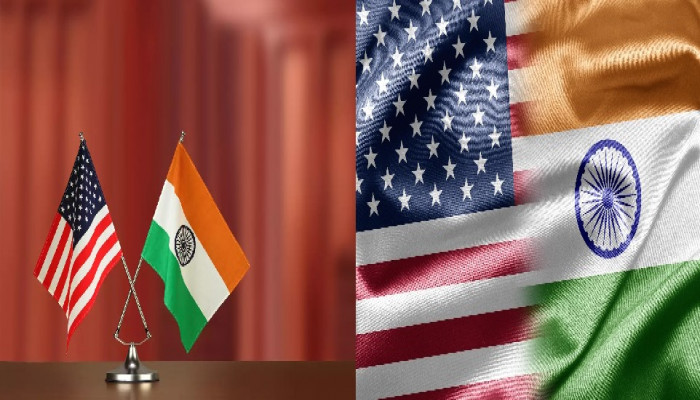USIRC raises concern about double-edged swords like currency monopoly, tariffs that are likely to impact US-India relations
- In Reports
- 10:59 PM, Dec 18, 2024
- Myind Staff
United States-India Relationship Council (USIRC) has been working to strengthen the US-India economic partnership for global growth, freedom, openness and complementarity-based growth of both nations.
Opponents want this vital partnership to derail on contentious issues like currency (US dollar) monopoly, de-dollarisation, free trade agreements (FTAs) and tariffs.
Certain concerns need to be attended to to strengthen this important partnership.
The foremost contentious issue to which executives of both the US and India have aired views on public forums is the US Dollar's monopoly vis a vis de-dollarisation.
India has made its position clear - it is not at all keen on de-dollarisation nor is it interested in weakening the USD, India has the least and easily manageable USD exposure. Supply Chain Monopoly is the main issue as it is much more dangerous.
US position is for continuing the USD monopoly. Nevertheless, currency monopoly being a potential fault line, USIRC urges for review of the US position from the prism of merit-based American dream which is also concurrent with the Indian value system.
An unbacked US dollar monopoly is the antithesis of merit. It doesn't augur well either for America or for any of the stakeholders. This may sound provocative but the USD monopoly is harmful to the US too in the long term. There is a compelling view that the USD monopoly has harmed the US and its international relations more than not. Even the so-called benefits of the USD monopoly are harmful in the long run.
Being a global reserve currency that facilitates international trade, finance and investment ought not to be at the cost of long-term American interests. Just as NATO and other nations have to fight their wars, similarly it is for the nations to fix the currency for their trading. It isn't the responsibility of the US to provide currency for their trading.
Second benefit - Being a trade currency does give some economic influence to the US. But dollar dominance can be counter-productive and unworkable too.
Third benefit – Seigniorage - Issuing the world's reserve currency generates revenue for the US. But perpetual printing of notes having skewed face value (compared to the printing costs) without commensurate backup reserves is dangerous for all.
If we look at the drawbacks, there is a strong view that over-reliance on the dollar's reserve status has led to complacency, reduced competitiveness and whopping trade deficits, to the extent that America's defence systems have become dependent on supplies from avowed enemies of America like CCP. Printing currency notes continually leads to inflation with erosion of purchasing power. USD monopoly has fostered a false sense of entitlement resulting in reduced innovation, decreased productivity and less investment in education as well as creaking infrastructure. This has also led to global resentment potentially undermining US relations.
It is said that "lazy spoiled brat syndrome" due to the USD monopoly has resulted in excessive focus on financial services, neglect of manufacturing & innovation and decline of manufacturing leading to job losses at home. Prioritising financial interests over trade policy has led to trade deficits and economic as well as strategic imbalances.
Observers say that the US must balance its economic influence with responsible financial management, fiscal prudence, investment in innovation and diversification of the economy. By addressing these challenges, the US would be able to avoid complacency and maintain its economic leadership, promote fair trade, implement balanced trade policies, address deficits, protect domestic industries, become a fiscally prudent nation, manage national debt and avoid excessive money printing.
With sound fundamentals, the US would be able to collaborate with other nations including natural ally India to maintain a stable international monetary system.
The other bone of contention is trade deficit, tariffs, free trade and related issues.
Tariffs are also double-edged swords. Meant to protect domestic industries by making imported goods more expensive giving an edge to own manufacturers and generating revenue for the government and jobs for people as well as to serve as a negotiating tool in international trade disputes, tariffs can lead to higher prices for consumers and resultant unrest, reduced competitiveness and also job losses in sectors that rely on imported goods. Tariffs can escalate into trade wars, disrupting global trade flows and their fallouts. Thus, tariffs as well as free trade agreements are tools fraught with unintended consequences. Their use has to be done very judiciously and sparingly.
Tariffs need not be applied against friendly nations like India which does not pose threats of illegal immigration or hegemonic monopolisation of resources and supply chains and have no malice towards the American nation, American economy & American dollar. India doesn't breed or export terrorism and doesn’t support IP pilferage.
Just as India and Israel are trying to be self-reliant (India talks about being "Atmanirbhar" i.e., self-reliant as national policy) nations have to be hard working to counter the challenges from globalist communist and Jihadi terrorist nexus.
The US reset to the American Dream of its founding fathers would mean "Be American, Buy American" buttressed by "Make American". Rather than artificial, anti-merit and counter-productive means like unchecked tariffs and unbacked currency monopoly, strengthening the fundamentals of the economy would go a long way unhindered.
Fundamentals of the respective partner economies have to be strong for the bilateral partnership to be strong. The US and India being two big economies have also to be two sound economies with strong fundamentals to be able to save the free world from communist and terrorist globalists.
Press Release of United States-India Relationship Council (USIRC)







Comments